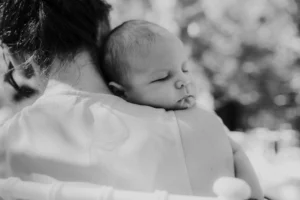You are awake and reading that correctly. Rocky Mountain Sleeping Baby is sharing “Dream Feeding” and what exactly, it is.
As certified sleep experts, it is our job, and duty, to keep up to date on all of the latest, and sometimes not so great, trends that are circulating for new parents, and share them with you.
Dream feeding is not feeding your baby in your dreams. I know I am guilty of this and have come to wonder why I am standing in the kitchen with a full bottle or breastfeeding a baby whose lips are nowhere near their target. Dream feeding is the idea of feeding your baby a bottle, or nursing them, at their normal bedtime, and then feeding them again anywhere between 3-5 hours later, typically before you and/or your partner go to bed, to avoid having to get up for a midnight feeding. The goal of dream feeding is to feed them while they are asleep, hence the term “dream feeding”.
The idea behind this is to fill their little bellies full so they are not waking up hungry giving both of you a full night’s sleep, and only having to feed again on their regular schedule the next morning. As your certified sleep consultants, we do not recommend this.
Feedings are for nourishment and more importantly, while your baby is awake and alerting you to their hunger. Feeding your baby when they are not indicating they are hungry is teaching them that food is a sleep aid, and it is possible they will grow accustomed to eating at bedtime and this is a not-so-fun habit to create, and even harder to break.
Your baby’s most quality consolidated sleep in a 24 hour period is from bedtime until about midnight. Arousing them from their sleep to eat at this precious sleeping time is not advised.
When our certified sleep consultants are working with you to sleep training your baby, we do not encourage this type of feeding, regardless of the age of your child. Your baby does not realize they are hungry if they are eating during their sleep cycle, and it triggers a cycle of not understanding when to alert you that they are truly hungry, and they will become accustomed to eating at or before bedtime. This is closely aligned to our certified sleep experts working with you on when to stop giving a toddler milk at bedtime.
Eating is a tradition that is most enjoyed at mealtimes, or as an occasional treat during the day or after dinner. Not being aware of what you are eating is not healthy for you, nor is it healthy for your baby. Giving a baby a bottle, or a toddler a snack, to keep them pacified is also not recommended either, as this creates an unhealthy relationship with food becoming their comfort.
If you have been providing dream feeds to your baby, it is okay! We are certified sleep experts, and our goal is to help and educate you. Do not be afraid to admit that you have been doing dream feeding to us, we never shame parents for doing anything they thought was the right idea for their baby’s health and needs. There is so much advice out there and many of us are new parents, too. We get it. We all have a common goal to do right by our children.
The certified sleep experts at Rocky Mountain Sleeping Baby can help you create a plan to reduce the dream feeds until they have fully weaned. The important key to this is being up-front and honest with us so that we can provide you with the best sleep schedule and training techniques for your baby and/or toddler.
If you are new to Rocky Mountain Sleeping Baby and our blogs, we shared in a past blog with parents that sleep training for an infant does not begin until your baby is at least 16 weeks old.
When our certified sleep experts are first working with your 16-week-old (4 months) infant on sleep training, we set a goal for 1-2 feedings a night, that will happen when your baby is fully awake, and our secondary goal is for 11 (eleven) to 12 (twelve) hours of sleep, a night.
If you are starting with us when your baby is a little older, around twenty-four weeks (6 months) we have only one goal of a non-interrupted sleep schedule of 11 (eleven) to 12 (twelve) continuous hours of sleep a night. This excludes any feedings and only solid sleep. As long as your baby is growing appropriately. There are always exceptions to this rule!
There are no wrong answers when it comes to parenting; only education and learning from certified sleep consultants on what we are learning to be the best options for your baby and child’s sleep schedules and working with you to help you create them. If you have not worked with your baby on these steps yet, and they are a little older than the recommended ages to start, it is okay. You are not hurting your baby or being a bad parent. We can work with any age from four months to toddler and pre-school-aged children.
Keep in mind the time frames we give are based on our training and what we have found to be the be solutions for these ages. There may be circumstances where your baby will still need a feeding due to a medical or height/weight issue past the 6-month mark and we will work with you to create an appropriate schedule for those specific needs.
As always, feel free to reach out to us with any questions, or concerns, or to start your sleep training schedule with one of Rocky Mountain Sleeping Baby’s certified sleep experts. Leave us a comment on other topics we can cover for you and check our past blogs for topics you may have missed.





